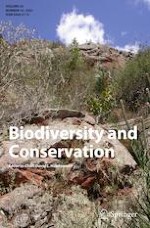19.10.2021 | Original Paper
Conservation conflicts and their drivers in different protected area management groups: a case study in Brazil
Erschienen in: Biodiversity and Conservation | Ausgabe 14/2021
EinloggenAktivieren Sie unsere intelligente Suche, um passende Fachinhalte oder Patente zu finden.
Wählen Sie Textabschnitte aus um mit Künstlicher Intelligenz passenden Patente zu finden. powered by
Markieren Sie Textabschnitte, um KI-gestützt weitere passende Inhalte zu finden. powered by
